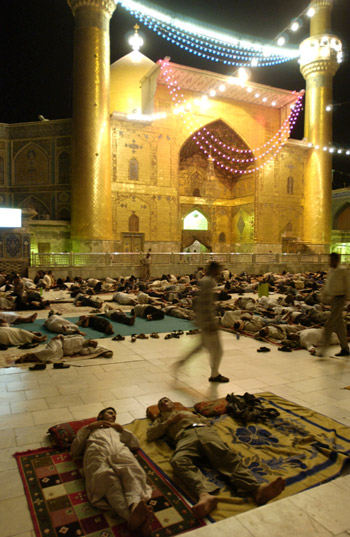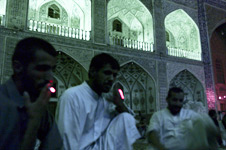
Najaf, Iraq, 17 August 2004. Followers and fighters of Moqtada al Sadr take refuge within the gates of the shrine, before the tomb of Imam Ali.
Photo: Thorne Anderson, Corbis.
Fatah was interested in talking. When I asked him to give an interview on tape, the sight of the black Panasonic video camera excited him so that he went on for a full hour about his persecution at the hands of Saddam. As he spoke, he spooled out his history in a cheerful way, with no inflection, no pause for thought. Fatah sounded upbeat when he described being tortured by Saddam. Where were the signs of shame and trauma? Nowhere. Fatah seemed to be an intelligent and optimistic man whose phone rang every few minutes. He also made sure we knew that he had access to fighters in the Mahdi Army, not just the political leaders. I let him become my primary contact in Sadr City. I introduced him to colleagues, invited him back to the hotel for lunch.
A few days later, I stopped by the internet cafe to give Fatah a copy of his videotaped interview. Just before I left, possibly to return the favor, Fatah went to his computer and said he had something interesting to show me. Fatah printed out a document that had an official Mahdi Army seal at the top. It was an official mobilization order for the followers of Moqtada al Sadr. It said that the truce would end in twenty-four hours. Fatah gave me a copy and smiled. It was August 4, 2004. I took the document to a reporter at the BBC, who ran with it in their broadcast that evening. By the following day, the truce that had held for a month had collapsed and there were major battles raging in Najaf and Sadr City. The siege had begun.
A week into the Shiite uprising, I was on the way to Fatah's office when I got a telephone call from a friend who said that Cho had been kidnapped in Sadr City. The only person we knew who had enough leverage to get him out was Fatah. When I arrived at the Internet cafe, Cho was already sitting in the back room, badly beaten, his face bleeding and his clothes torn. His attackers had destroyed his Nikons and robbed him of everything else.
"What happened?"
Cho shook his head. "I can't tell you here."
Four attackers had fired at him while he was trapped in his car, then they pulled him out and pistol-whipped him. The men said they were going to kill him. After Cho left the cafe, I stayed because Fatah asked me to talk to him about what had happened. Around seven o'clock, just as it was getting dark, a white station wagon pulled up with the men who attacked Cho. I was not allowed to go to the window when Fatah went out to greet them. Fatah had been the one who arranged the attack.
There are several reasons why he would benefit from that act of violence. He was a brutal and cunning man, who used fear to gather information using secret police methods. I learned later that he was not above outright murder. Fatah's methodology was simple, if he found a weakness and exploited it, then he would lean on the compromised person to provide information about his friends. It was the signature style of a Baath party intelligence agent, a member of the mukhabarat. Blackmail and carefully made threats were his instruments. A day after the attack on Cho, I met Fatah at a restaurant near his office and was interrogated. Precision and thoroughness in the questioning made it seem like a professional job.
"You are from which country? Tell me again."
"Ireland."
Pause.
"I heard that you are an American. Maybe you have dual nationality?"
Pause.
"Who said that?"
"The sheikh said it. He says that I do not know enough about you, that I am spending time with a man who is not truthful, and this was very embarrassing for me."
"Which sheikh?"
"You were acting suspiciously in Najaf and there was an investigation."
"That's ridiculous."
Fatah was angry. "I need to see your passport immediately."
"I don't have it with me."
"No?"
"No. I don't carry it with me because of thieves."
"You can tell me if you are an American, because I am a sophisticated man."
"I am an American."
Fatah smiled, he was genuinely happy. He hated Americans. That was something I knew.
"You must tell me everything."
"That's all there is to tell, Fatah."
"You look sick. Are you afraid of something?"
"No."
"If you are afraid of something, and you run, then I know you are guilty."
Fatah held a cup of water and poured it out in a smear across the table. Dead light came off the surface. "You see? the problem is finished between us. That is how we finish things in Iraq."
It is possible that he had Cho beaten to coerce me into giving him information about our friends and colleagues. This Fatah incident is central to how we got to the Shrine in Najaf during the siege. We went to Najaf because staying in Baghdad seemed like a bad idea. I was running from him.
How did Fatah know so much about us? A few of us at the Dulaime had intelligence files under the previous government. Thorne Anderson, a photojournalist, and a close friend I'd met in Afghanistan, was deported by the mukhabarat, during the early days of the of the invasion. His partner, Kael Alford, also a photojournalist, was one of the few westerners allowed to stay. Government minders and intelligence people had watched both of them closely because Thorne and Kael were also Americans. They had covered Balkan wars, lived in impoverished Eastern European countries, were fans of literature. We listened to the same weird music and lived in the Dulaime hotel. Thorne played Daniel Johnston songs on a ruined guitar by the pool.
After the first session in the restaurant across from the Internet cafe, Fatah took me over to the Habaibna restaurant for the second phase of his interrogation.
 LEAD IMAGE: 17 August, 2004, Najaf, Iraq. Young followers of Moqtada al Sadr inside the shrine of Imam Ali during the siege.
LEAD IMAGE: 17 August, 2004, Najaf, Iraq. Young followers of Moqtada al Sadr inside the shrine of Imam Ali during the siege.Photo: Thorne Anderson
© Phillip Robertson, 2009-2020.
